What is mulch? It’s a surprisingly simple and inexpensive way of improving your garden and lawn! Whether you’re looking to improve a home garden or the outdoor space at your commercial property, mulch is a fantastic way of increasing soil fertility, letting plants grow bigger and healthier, and keeping your lawn green and lush.
Mulch comes in various forms, and owing to the fact it is inexpensive and easy to use, it’s a fantastic way for businesses to stay on top of their outdoor space. Laying mulch can help keep plants healthy and lays the groundwork for landscapers to easily keep on top of your lawn.
If you’re planning on maintaining your commercial garden space on your own, you’ll need to know the best kind of mulch to use, the properties of mulch, and what to look out for. At Earth Development, we think it’s important to provide this kind of knowledge, as well as connect business owners with trusted and local landscape contractors who can manage your garden for you.
Read on and we’ll explore what mulch is, why it’s so fantastic for your garden, and the options available to you.
So, What Exactly Is Mulch?
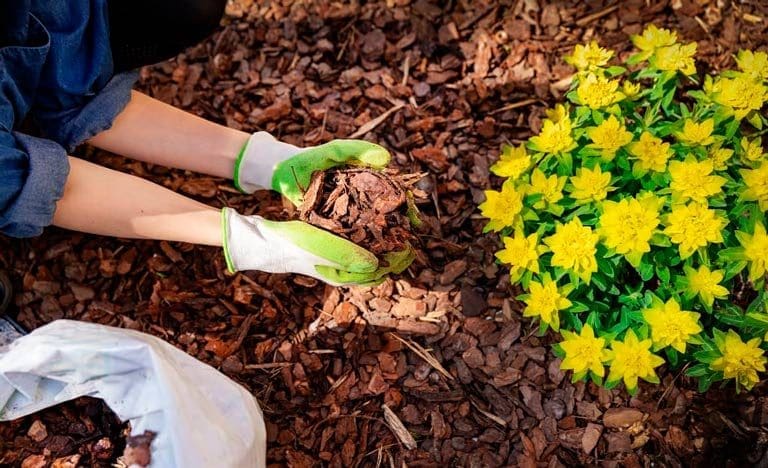
Mulch is a catch-all term that refers to any product that is spread over the surface of the soil. This isn’t compost and it isn’t technically soil, but it is used in tandem with soil to provide nutrients and protection. It is a covering that, over time, helps improve the structure of the soil, provide nutrition, and even provide protection from high winds and erosion.
If you’ve wondered, ‘what is mulch used for?’, then that’s the answer to that question – but you might also be wondering why it’s such a fantastic option for businesses and whether there are any downsides. And there are. Mulch is great as long as you choose the right one and use it in the right way.
At Earth Development, we connect businesses with trusted local contractors who know the benefits of mulch, how to use it, and how different varieties of mulch can help different soils and gardens. Let’s take a look at the kind of thing our commercial landscapers in Wisconsin and Ohio consider when working on commercial gardens and courtyards.
What Are the Advantages and Disadvantages of Mulch?
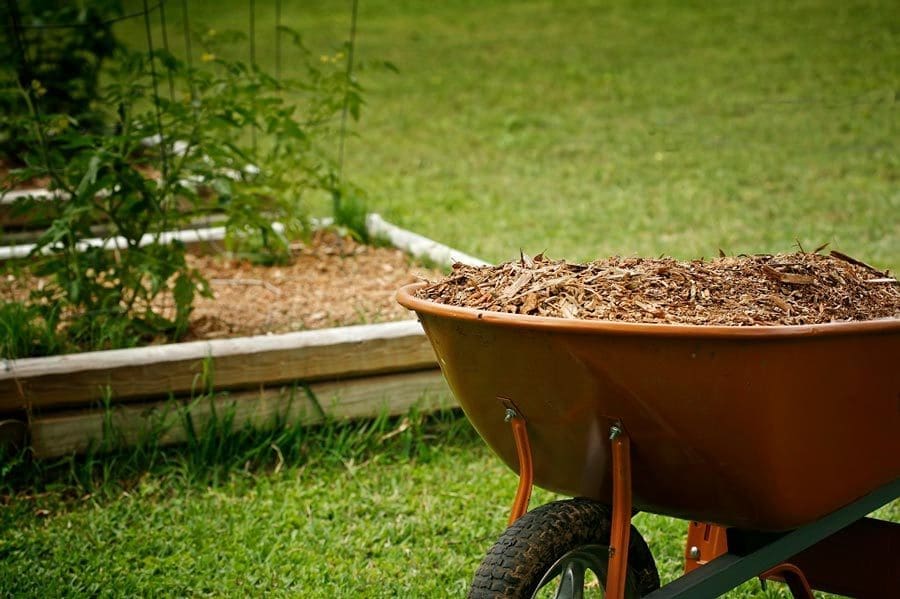
Mulch is inexpensive and extremely effective, but as with everything in life, there can be disadvantages – particularly if you use it incorrectly.
Commercial landscaping experts love mulch because it:
- Helps soil retain moisture by trapping it in
- Feeds the soil with new nutrients
- Helps maintain an even soil temperature
- Prevents soil erosion
- Reduces compaction in soil (which aids moss growth!)
- Prevents the growth of weeds
- Creates a neat and “finished” look!
If you’re using mulch, and you’re not relying on the services of our expert commercial landscapers, you should be aware of the potential disadvantages of using mulch.
These include:
- In the same way that mulch stops weeds from germinating by blocking the sun, it can stop seeds from germinating too
- Heavy rain can make mulch soggy and muddy (so remove it if that happens!)
- Slugs and earwigs love certain kinds of mulch…so keep the layer thin and inches away from the bases of plants
Kinds Of Mulch to Choose From
Now you know the benefits, let’s explore “what is mulch made of?”
This depends, as there are lots of mulches to choose from. The question really is which is the best mulch for gardens and commercial courtyard spaces. These mulch options can be divided into two – organic and inorganic.
Organic Mulch
Organic mulch can be extremely cheap, and also very effective. Your natural mulch options are varied and can be particularly good at providing additional nutrition for your soil.
These options include:
Bark
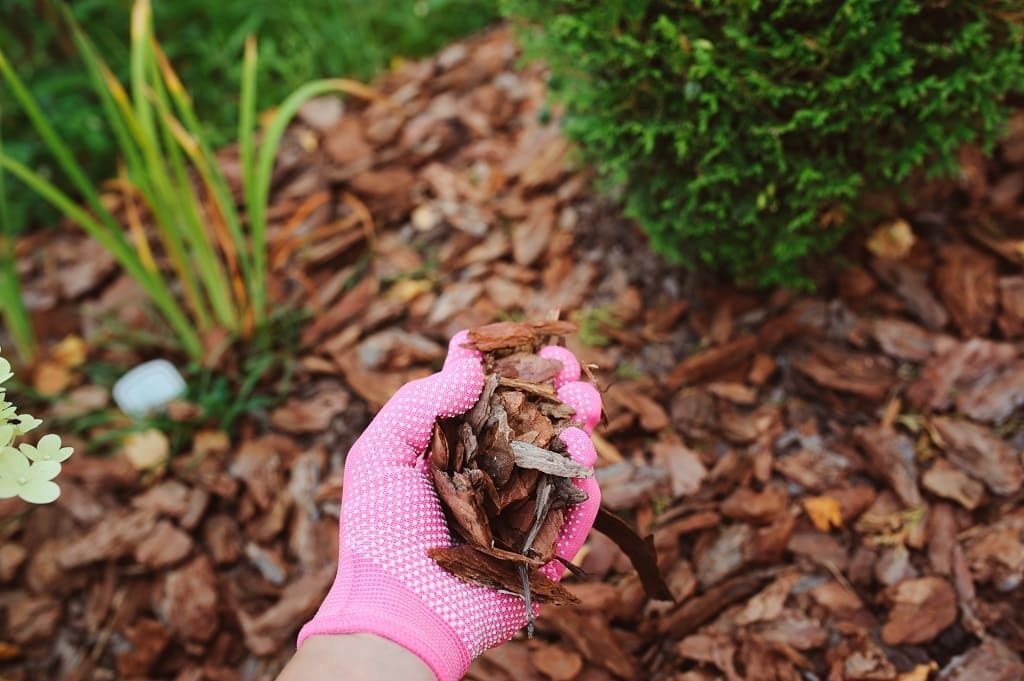
You’ve probably seen bark mulch already. It looks attractive and is great for walkways – a common feature in commercial gardens!
Grass Clippings
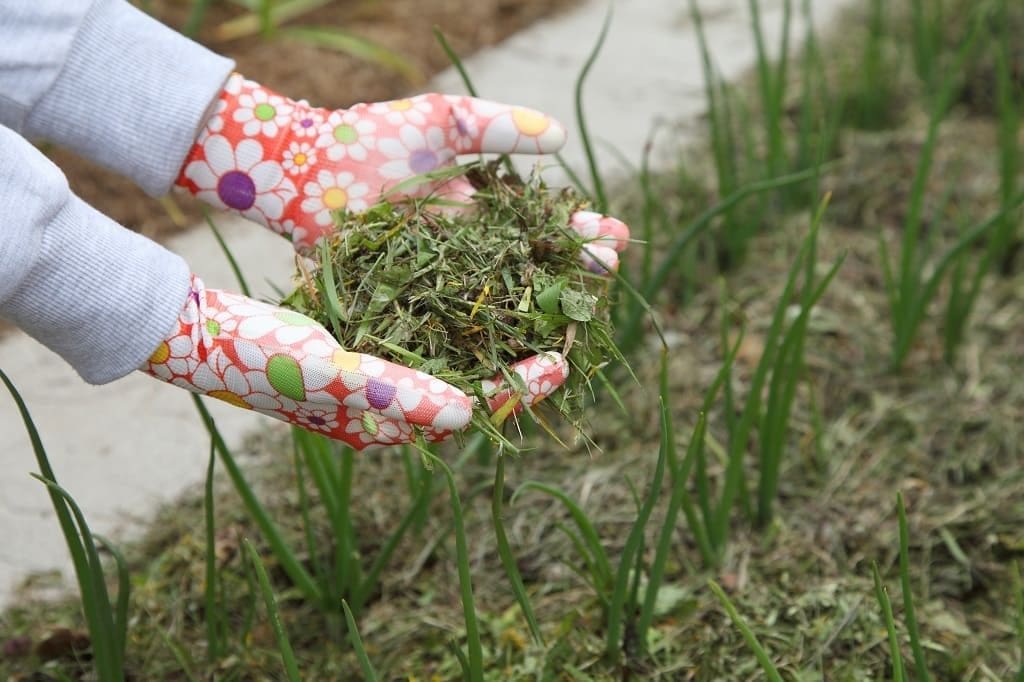
These are better suited for areas that you don’t see much, but where you want to prevent weed growth. It doesn’t look fantastic, but it works very well.
Shredded Newspaper

This is another one best suited for areas that can’t really be seen. Given many newspapers now use organic dyes and ink, shredded newspaper is great for retaining moisture and controlling temperature.
Shredded Leaves
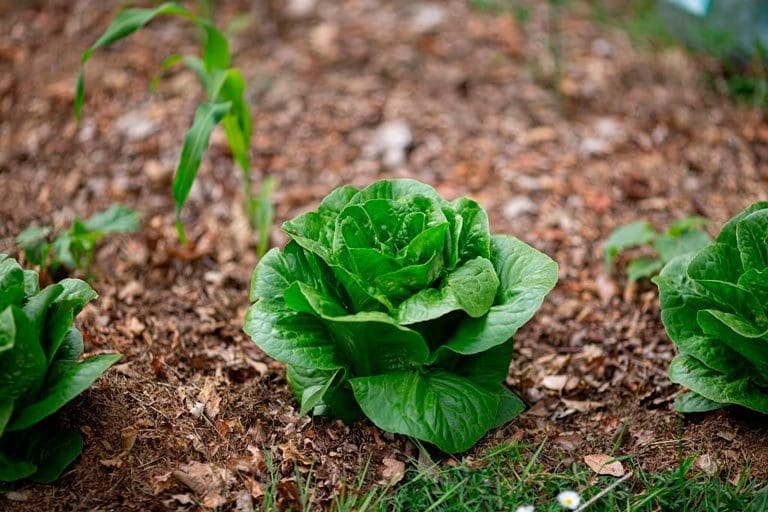
Shredded leaves are free, as long as you have plenty of them in your garden. They might not look good but create a nice woodland look.
Straw
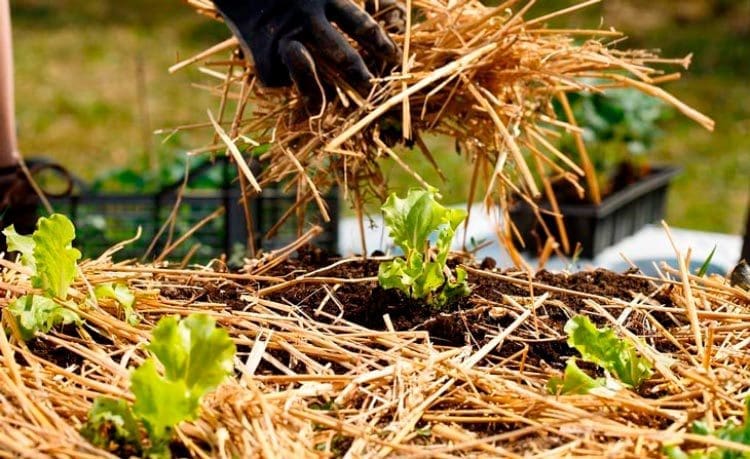
Straw and hay help make garden paths less muddy – another benefit for commercial garden spaces.
Pine Needles
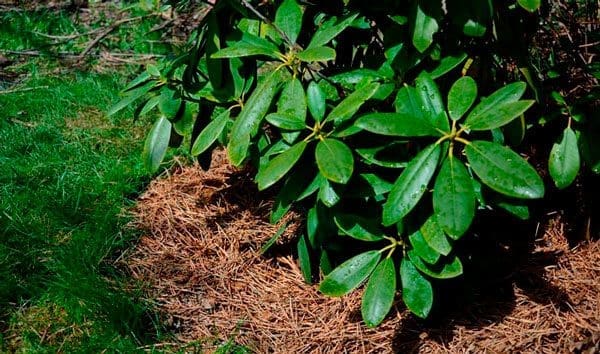
Another favorite of the natural mulch options and this one also gives you a nice woodland look.
Inorganic Mulch
Inorganic mulch does a good job of stopping weeds and holding in moisture, but don’t expect it to help with fertilizing the soil. The three main artificial mulch types are:
Plastic
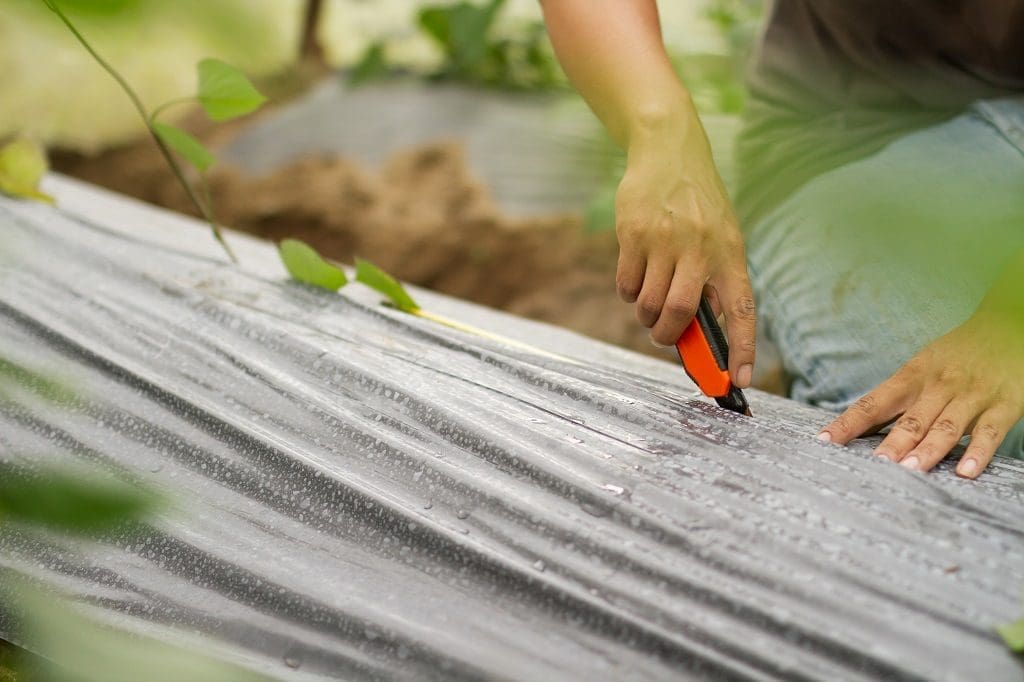
Plastic should be used sparingly. It’s good for killing weeds but it can easily kill other plants too.
Stone and Gravel
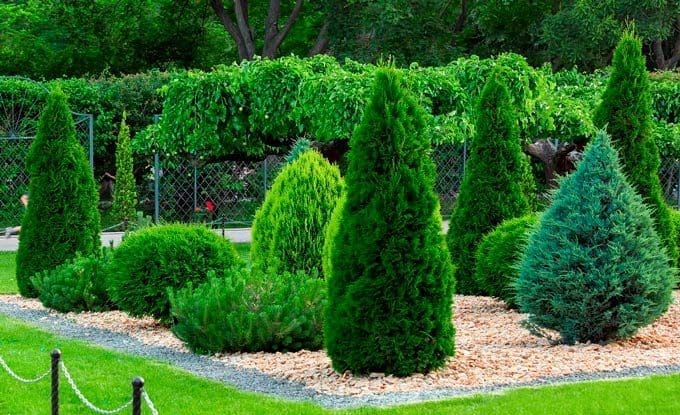
Gravel and stone are perfect for commercial gardens. They stop soil from eroding, they are good for drainage, and they look good.
Landscape Fabric
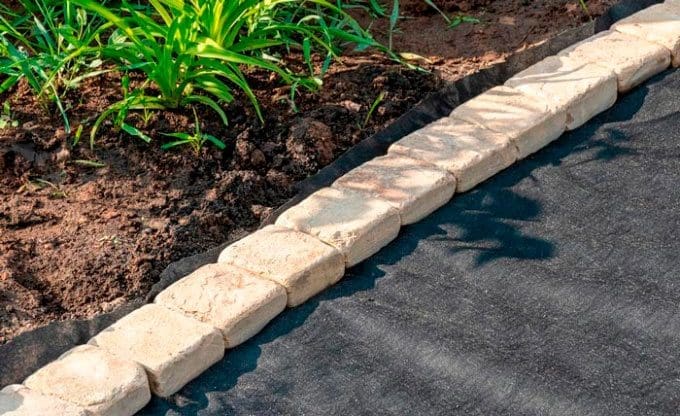
Like plastic, fabric can hold in moisture well but can also kill plants – so be sure to cut holes and allow sufficient water to get through.
Which Mulch Should You Choose?
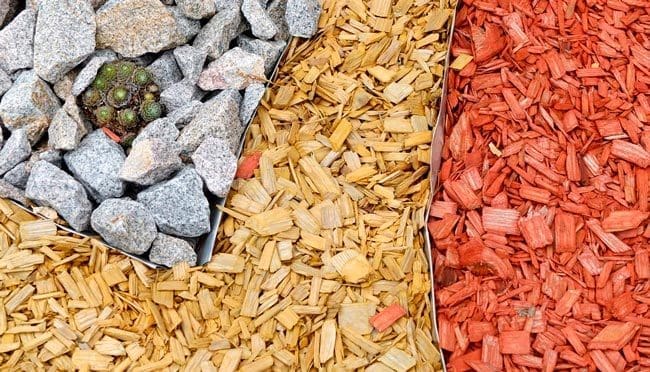
Choosing between these various types of garden mulch can be difficult. Using the bullet points above, you should be able to decide which one is right for you.
For commercial gardens where you’re already confident in the soil’s quality, artificial mulch can provide good protection and make your garden look as slick and well-presented as possible.
However, organic mulch is better for helping improve plant health. So the choice is yours!
Remember, also, that Earth Development can connect you with incredibly talented local landscapers who understand the difference between various mulches. They’ll help you decide what is right, and can also provide comprehensive lawn care and maintenance, and cater to all your commercial landscaping needs.
Does Mulch Attract Insects?
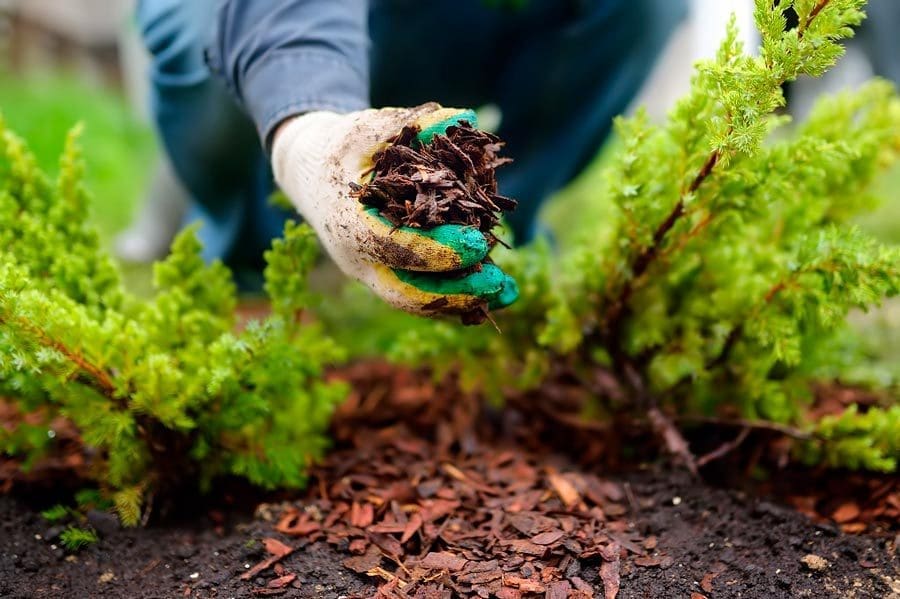
Mulch can attract insects, but there are a few things you can do about that.
The first is to make sure you only use a thin layer of mulch. This stops the insects forming a home in the thick organic mass.
Secondly, you can use pesticide to prevent infestations.
Finally, you could also opt for cedar or cypress tree bark. These are great at naturally repelling insects.
What’s the Best Mulch for Borders?
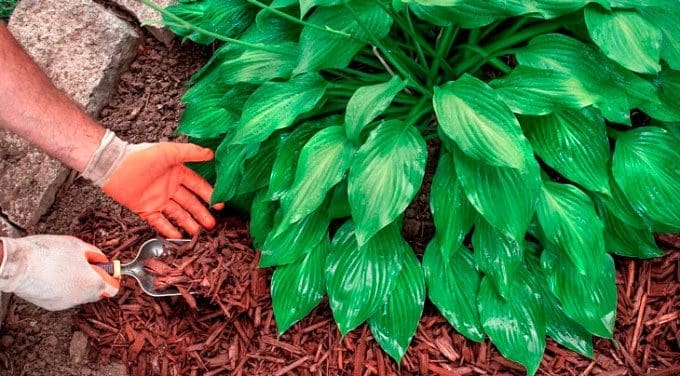
The best border for mulch…is any border with plants! Mulch provides great protection for plants, ensures they always have access to the nutrients and water they need and can look great too.
If your commercial garden has walkways, consider stones and gravel. It’s durable, and it looks good. If you care more about your commercial garden’s plants and trees, then opt for high-quality natural mulch instead!
Local Landscaping Experts Take Everything Off Your Hands
Earth Development is known and trusted by businesses throughout Wisconsin, Ohio, and beyond. We have years of experience providing businesses large and small with comprehensive lawn care and maintenance, as well as full commercial landscaping services.
We draw up custom maintenance plans to keep your property cared for all year round, letting you spend time on the business that matters. Our contractors know the best mulch for landscaping, they know about using mulch in landscape design, and they can make informed decision to keep your garden well kept.
For more information, for a free quote, or just to talk to a member of the team, don’t hesitate to give us a call today!
